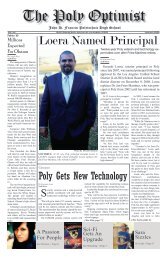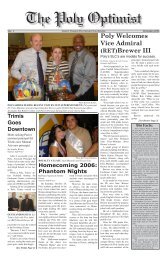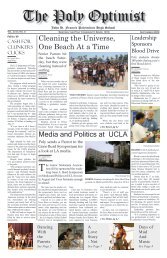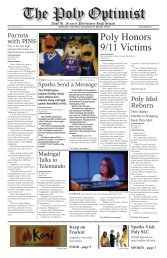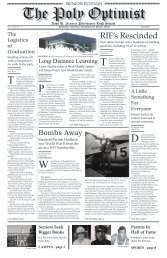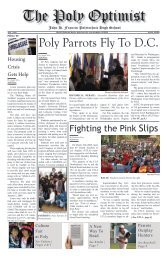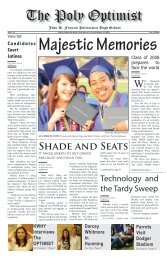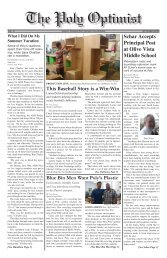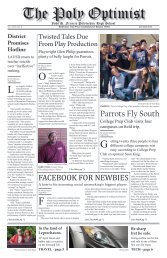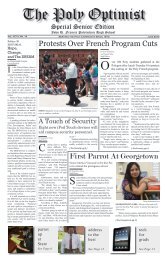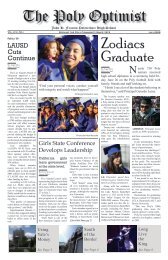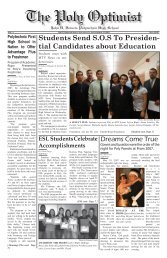September 08 - Francis Polytechnic High School
September 08 - Francis Polytechnic High School
September 08 - Francis Polytechnic High School
Create successful ePaper yourself
Turn your PDF publications into a flip-book with our unique Google optimized e-Paper software.
6 <strong>September</strong> 20<strong>08</strong><br />
Campus Connection<br />
The Poly<br />
Optimist<br />
She’s A<br />
California<br />
Girl Now<br />
By Hazel Kasusky<br />
Staff Writer<br />
Being the new kid in high school is hard<br />
enough, but coming from another country,<br />
with little knowledge of the English<br />
language, makes the transition even<br />
more difficult.<br />
Poly junior Duaa Ma’ayah, who traveled from Al-<br />
Huasyn, Jordan to Los Angeles, California a year ago to<br />
join her father and two sisters, seems to have done quite<br />
well.<br />
“You can accomplish anything if you believe you can<br />
do it,” she said.<br />
Poly, of course, is a little bit different than Dalia’s<br />
former school in Jordan. There, uniforms were mandatory<br />
and any signs of rebellion, like makeup or unusual<br />
hairdos, were prohibited. Teachers paid little attention to<br />
failing students.<br />
Dalia found that Poly does just the opposite.<br />
“The teachers here want you to pass the class,” she<br />
said.<br />
When Dalia first enrolled at Poly, she took ESL classes<br />
and loved it.<br />
“When I finished ESL, I was really sad,” Dalia said. “I<br />
was happy because I was going to be in regular English,<br />
of course. But the way that ESL teachers teach us--they<br />
help us a lot. The class all had one goal: we all wanted to<br />
learn English. We all wanted to get better.”<br />
Dalia has also been exploring new artistic endeavors,<br />
such as music and dance.<br />
“I tried playing the piano, well the keyboard, but I<br />
didn’t like it,” Daila said.<br />
What she does enjoy, however, is belly dancing. Dalia<br />
and her friends, with the help of her sister, have begun a<br />
belly dancing club at Poly.<br />
“I want to try to do an announcement for whoever<br />
wants to join,” Dalia said. “Me and my friends are planning<br />
on how we are going to practice.”<br />
Dalia’s diet still includes lots of Jordanian foods like<br />
duuali and mnasife. Duuali is a dish of rice and meat<br />
wrapped in grape leaves. Mnasife is a dish of rice with<br />
yogurt as soup and plenty of nuts and meat.<br />
“We go to Sunland Produce,” Dalia said. “It’s an Arabic<br />
store. We always go to the one in Northridge because<br />
it’s bigger. I feel happy. Everything’s in Arabic—the<br />
newspaper’s Arabic. You can just grab one and read it.<br />
It’s different.”<br />
“I don’t really care about the other stuff. But the<br />
things that I want, like my favorite chocolate, my favorite<br />
candy, I can’t find it,” she said.<br />
Her father and sister are currently visiting Jordan. Dalia<br />
too would like to return to visit her family there.<br />
“It isn’t the same, talking to them on the phone, you<br />
know,” she said. “You can’t hug a person by phone.”<br />
As the youngest of her siblings, she is glad she came<br />
to the United States.<br />
“My family tells me that they’re proud of me,”<br />
Ma’ayah said. “It feels like the best thing in the world.”<br />
College<br />
Journal<br />
As a service to our readers,<br />
the OPTIMIST asked<br />
one Poly senior to tell us<br />
about her senior year.<br />
Below is the second installment<br />
of her story.<br />
By Belle Tadena<br />
Layout Editor<br />
In my previous years at Poly, I never<br />
truly realized the how much I have to do<br />
to get into a “proper” college.<br />
Admission requirements always depend<br />
on the college the student is applying<br />
to.<br />
Some seniors choose private colleges<br />
or the UCs, where test requirements<br />
and results are high. Some colleges, like<br />
CSUN, only require applicants to take the<br />
SAT Reasoning or the ACT.<br />
I registered for the SAT Reasoning and<br />
the SAT Subject, as well as the ACT long<br />
before the deadlines to ensure my appointment.<br />
Since I’m a senior, I’ll need to<br />
finish as much as I can as early as I can.<br />
College representatives often visit the<br />
Poly campus or other campuses where<br />
orientations are held. These conferences<br />
are beneficial since the representatives<br />
provide insights on their school.<br />
APs start in <strong>September</strong>, some start on<br />
November. This means that along with<br />
my extracurricular activities, I’ll have to<br />
do well on the AP Tests. I’ll have to study<br />
hard everyday to prepare.<br />
This year, my most important and<br />
long-term goal is to master time management.<br />
This will not only be useful for<br />
me for my senior year, but it’ll be of great<br />
use during college.<br />
Money is also an issue. All colleges<br />
have fees to pay and many times tuition<br />
is high.<br />
Most college students apply for financial<br />
aid provided by their school. They<br />
also apply for scholarships and grants<br />
offered by organizations. Many students<br />
apply for the FAFSA, a government financial<br />
aid/grant that doesn’t have to be<br />
repaid.<br />
Seniors should visit the College Office<br />
at least once a week to check on available<br />
scholarships or check the Poly website.<br />
Other websites give information about<br />
scholarships offered to all students by<br />
various organizations.<br />
Keep a look out for scholarships.<br />
There’s always college money available<br />
for students.<br />
Baida Menu<br />
[ Menu, from Page 1 ]<br />
preparers are given a picture<br />
and a recipe for each new<br />
item, along with step-by-step<br />
instructions on how to prepare<br />
and present the food.<br />
Some of the items are more<br />
difficult to prepare than others,<br />
said Galvez, who recently tried<br />
some of the items on Baida’s<br />
menu.<br />
“Monday I tried the<br />
Grilled Chicken Sourdough<br />
Sandwich,” Galvez said. “I<br />
also tried the Chicken Caesar<br />
Wrap. The chicken is very<br />
delicious, like what you would<br />
get at a deli or one of those<br />
restaurants that are very fancy.<br />
It’s the same way.”<br />
The first Baida recipe,<br />
a Chicken Italiano Melt,<br />
launched in April.<br />
“This is something I would<br />
sit down and eat,” Baida said<br />
of his creation. “It’s got that<br />
wow.”<br />
“We have to go back to<br />
making people love food.”<br />
“Down the line I want to<br />
try things like dim sum and<br />
room service to classrooms.<br />
Because this is such a diverse<br />
district, I also want to talk<br />
with parents about dishes they<br />
make at home and see if some<br />
of those can be adapted to our<br />
program as well. I also want to<br />
develop menus — and perhaps<br />
even a coffee program — for<br />
the faculty. They have a very<br />
tough job and they are often<br />
forgotten.”<br />
Baida, 39, grew up in<br />
Philadelphia and Miami,<br />
moving to Southern California<br />
as a teenager. He went to North<br />
Hollywood <strong>High</strong> and brought<br />
his own lunch.<br />
Galvez, who has been at<br />
Poly for four years, previously<br />
worked at North Hollywood<br />
<strong>High</strong>.<br />
Material from the following website<br />
was also used to prepare this story:<br />
http://food-management.com/business_topics/menu_cuisine/new_<br />
chef_school/<br />
Parrots in Training<br />
[ Marathon, from Page 1 ]<br />
more your energy is depleted,”<br />
said Calzada. “During one of<br />
the marathons, my 22nd mile<br />
was difficult. My right knee<br />
gave out and I practically<br />
crawled the next four miles for<br />
two hours.”<br />
However showing up to<br />
practice is not mandatory.<br />
“Although I take roll, it<br />
does not count against them<br />
when they do not show up to<br />
practice,” said Calzada.<br />
Conditioning is not enough,<br />
Calzada says. A healthy diet<br />
is an important aspect of<br />
running.<br />
“They have to be eating<br />
carbs to burn sugar,” said<br />
Calzada. “They also need<br />
to have protein to avoid the<br />
body stealing energy from the<br />
bones.”<br />
But running a marathon has<br />
more than just health benefits,<br />
Calzada says.<br />
“The objective is to give<br />
students an outlet, to take<br />
them from a short term goal<br />
like completing a marathon to<br />
reaching a broader goal like<br />
completing an education.”<br />
Students take on<br />
responsibilities like showing<br />
up to practice on time.<br />
“The whole thing<br />
is connected to school<br />
responsibility and selfdiscipline,”<br />
said Calzada.<br />
Thanks to non-profit<br />
Students Run LA, Poly<br />
students are able to run the<br />
marathon without spending<br />
much money.<br />
“They provide students<br />
with clothes, running shoes<br />
and all expenses except<br />
transportation,” said Calzada.<br />
Entrance fees for the LA<br />
Photo by Michael Obando<br />
COACH: Runner Chante<br />
Calzada conditions Parrots.<br />
marathon are $90-100 because<br />
the marathon committee has to<br />
shut down streets.<br />
“There are nine different<br />
races in the marathon that<br />
can easily cost over $500 if<br />
students run without Students<br />
Run LA,” said Calzada.



